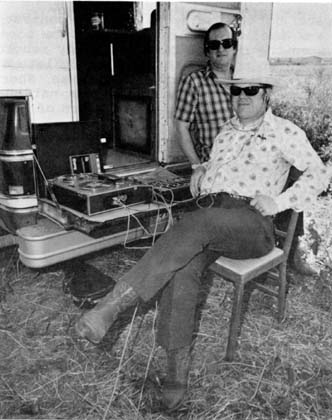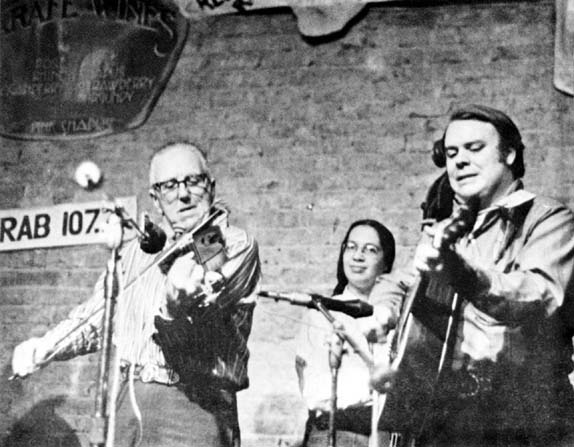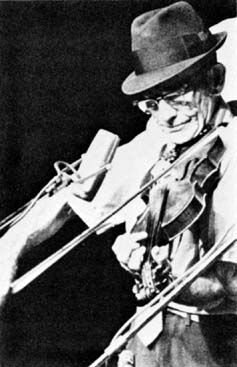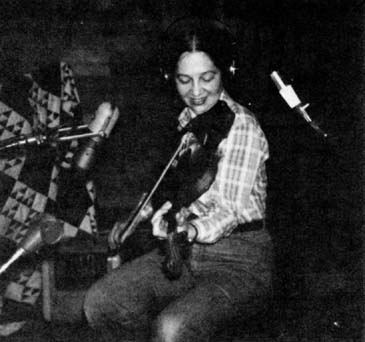
| HOME | ARTICLES | V & P WILLIAMS | CONTACT US |
Voyager Recordings & Publications
The following article was printed in The Devil’s Box, a publication of the Tennessee Folklore Society, Summer 1994 issue. This very good magazine on fiddling in the U.S. no longer is being published.
Voyager Recordings
Small Independent Record Companies
Number Two in a Series
Phil and Vivian Williams got started with the record business in the early 1960s. They had moved to Seattle in 1959, and in 1960 got heavily involved with the traditional old time and bluegrass scene in Darrington, a logging town in northwestern Washington populated largely by people from North Carolina. They started recording jam sessions and the annual Timber Bowl fiddle and band contest (which was discontinued in the mid-'60's). Their first released recordings, two 45rpm records of Fred McFalls and the Carolina Mountain Boys performing at the Timber Bowl, were custom pressed around 1963 on a local recording studio's "Audio Recording" label.
Just after these records were released a friend who owned a nightclub in Pioneer Square asked if they would do a recording of a rhythm and blues band he had booked into the club. Phil and Vivian had the equipment and he had the desire to get a record label started. Thus was hatched their first independent record label — "Crossroads Records." They next did a 45rpm record of Vivian playing Lee Highway Blues and Back up and Push from tapes made at the Darrington fiddle contest. All the recordings done up to this point were from location recordings. Kappie Kappenman, a square dance caller they had been playing for (and still do) , requested that their band, the "Turkey Pluckers," make a record for square dancing. They set up their rather primitive equipment in a vacant apartment and recorded Chinese Breakdown and Dance All Night — their first "studio" recording.
Over the next few years many 45's were produced on the Crossroad label. They had a connection with a juke box operator who also managed some country western musicians. He had Crossroad records on jukeboxes throughout the West and made them enough money to buy some better recording equipment. Whenever the jukebox chain could use another "standard," the musicians would show up in Phil and Vivian's living room and by the end of the evening another single would be ready for the pressing plant.
In 1964 they went to the national fiddle contest in Missoula, Montana. This was their first introduction to some of the great oldtime fiddlers on the contest circuit. They recorded some great jam sessions there, the most notable one being late at night in the Palace Hotel bar, with fiddlers like Texas Shorty and Byron Berline. The next year they went to the national contest at Weiser, Idaho and brought back many more hours of jam session tapes (see photo below).

The first Voyager record, "Fiddle Jam Sessions,"
resulted from sessions like this one at the 1965 National Oldtime Fiddle Contest in Weiser, Idaho. Here Mississippi fiddler Bill Mitchell (facing the camera) is accompanied by Vivian Williams (guitar). |
After returning from Weiser in 1967 they were listening to a recording made in the basement of the Weiser Junior High School of Byron Berline playing up a storm on "Sally Johnson." This was dynamic fiddling, the kind rarely heard on the stage at a fiddle contest, and not available on the official contest recordings. Phil and Vivian felt that this was the real essence of oldtime fiddling and the real reason to go to contests. Realizing that there must be at least a handful of others out there somewhere who also got off on this type of music, they determined to release an LP of the best of these jam session field recordings. They assembled their favorite cuts from the many hours of music they had recorded since 1964, got permission from the fiddlers involved, and released their first LP, VRLP 301 "Fiddle Jam Sessions."

Several of the Voyager recordings were taped in the field.
Here Phil Williams (seated) and Richard Ponshock are setup
to do some recording at the campground at the
National Oldtime Fiddle Contest in Weiser, Idaho (circa mid 1970s).
They had decided not to use the "Crossroad" label since it involved other people, and they wanted a label to designate the type of material to which they could make a personal commitment. A friend had been issuing Scandinavian music on his "Viking" label with a Viking ship logo. He suggested that they call their label "Voyager" since they traveled all over to get the material and use a modification of the Viking sail as the logo. Thus was born Voyager Recordings.Voyager has released forty-eight LPs, one CD, twenty-one 45s, and nine cassettes so far. The releases have featured primarily fiddlers. The over eighty fiddlers represented in these releases range from very well known performers like Byron Berline, Benny Thomasson, Mark O'Connor, and Joe Pancerzewski, to fiddlers who are hardly known in their home towns, but can play a good tune.

Fiddler Joe Pancerzewski is accompanied by Vivian Williams (bass) and
Phil Williams (guitar). (Early 1970s photo by Paul Gillingham.)
Some productions document events like the Tenino Oldtime Music Festival, the Northwest Folklife Festival, and the Festival of American Fiddle Tunes, and are really good field recordings. Other productions were recorded in their own studio and in studios around the country. Their record of Jerry Robichaud was recorded in a basement in Massachusetts by a recording engineer from Rounder Records. Marc Savoy and Dewey Balfa were recorded in Marc's house in Louisiana by John Watt on equipment sent from Seattle by rail freight. The great Quebec fiddler Louis Boudreault (Editor's Note: see review of this fine Voyager release in the last issue of The Devil' s Box) was recorded for Voyager by Mike Seeger at the facilities of Michael O'rourke's Grassroots Records in Portland, Oregon, while Mr. Boudreault was on tour.
The Benny and Jerry Thomasson record (Editor's Note: This superb release was reviewed in the Winter 1993 issue of The Devil's Box.) was recorded by Brooks Otis in a field at Weiser on a battery operated recorder.
Besides the fiddle, oldtime, and bluegrass records, Voyager has released traditional jazz, Russian balalaika music, Dumisani Maraire's African marimba ensemble, Scandinavian, Hungarian, and Yugoslavian dance music, a classical choral records, and a cassette of Jewish stories.

The legendary Benny Thomasson is shown
performing at the Northwest Folklife
Festival during the mid 1970s.
In 1983 Voyager added "Publications" to its name when Vivian published her "151 Brand New Old Time Fiddle Tunes" book, followed by the second volume, "141 Brand New Old Time Fiddle Tunes," and the third, "169 Brand New Old Time Fiddle Tunes." This series provides a publication forum for the many wonderful oldtime style fiddle tunes being written by contemporary fiddlers. The first volume featured tunes by four fiddlers. The second volume has tunes by twenty-two fiddlers, and the third by eighteen. This series has been well received and Phil and Vivian believe it will form an important addition to the published fiddle repertoire. Some of the tunes are being performed regularly at old time fiddle shows and gatherings across the United States and Canada. They have also published "Pleasures of Home," a book of previously unpublished fiddle tunes collected many years ago in North Dakota by Joe Pancerzewski. Their most recent book, published in January 1992, is "The Mandolin Player's Pastime," a collection of 140 traditional reels, hornpipes, jigs, etc. set in both standard notation and mandolin tablature.

Vivian Williams recording her excellent Voyager release, "Winter Moon."
Record production has slowed over the last few years, due in large part to rising costs of production and changes in format, distribution, and marketing in the industry. While the music Phil and Vivian like best is far from the mainstream, they feel they can keep the record operation commercially viable by recognizing that the sales always will be limited and that they simply have to budget carefully for new releases. While they would like to issue more field recordings of jam sessions and more anthologies featuring unknown performers who should be heard, this has become economically prohibitive in recent years. Voyager has never applied for grant money, although Phil and Vivian have assisted non-profit organizations in their own traditional music projects. For instance, Northwest Folklife's Washington Traditional Fiddlers documentation project, begun by the Centrum Foundation and funded by the NEA and the Washington State Arts Commission, used some of Phil and Vivian's tapes.
Voyager now issues recordings on cassette and compact disc, since LPs don't sell any more. They have been pondering compact disc re-release of material previously issued on LP, or perhaps collection of some of the best of the old material. This is still relatively expensive for material that would probably have low sales volume. They intend to continue issuing material that they like and believe to have sufficient commercial viability to warrant the production cost and trust that there will continue to be a sufficient market among the dedicated few to keep Voyager going for at least a few more years.
Return to Articles page![]() Return to Voyager Recordings Home Page
Return to Voyager Recordings Home Page